SHINZO ABE
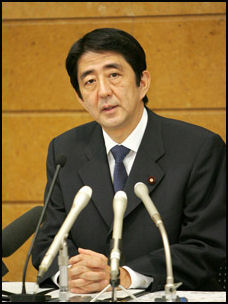
Shinzo Abe became Japan’s new Prime Minister in September 2006 after Koizumi retired. He took office at the age of 52, making him one of the youngest prime ministers to take the office, and the youngest since World War II. He was Japan’s first prime minister to be born after World War II.
Abe was chief cabinet secretary and secretary general of the LDP before becoming Prime Minister. He ran against Foreign Minister Taro Also and Finance Minister Sadakazu Tanigaki in the LDP election In a vote among 403 LDP lawmakers in the upper and lower houses and 400 rank and file party members Abe took 464 votes (267 LDP lawmakers and 197 rank and file LDP members) . Aso took 136 votes (69 LDP lawmakers and 67 rank and file LDP members); Tanigaki took 102 votes (66 LDP lawmakers and 36 rank and file LDP members).
Abe was Japan’s 90th Prime Minister and the 57th person to ascend to the post. He was formally named Prime Minister in a Diet session in October. He won so easily because the major LDP factions, which had been suppressed under Koizumi, jumped to his support in hopes of winning cabinet positions, He began his term with a 70 percent approval rating. Abe was relatively inexperienced. He had done little to distinguish himself as a law maker other than support the North Korean abductees. He was regarded as a protegee of Koizumi yet the two men didn’t seem to have a particularly warm relationship or have much in common. The opposition DJP criticized his “nationalist” tendencies. Many members of his Cabinet were regarded as nationalists and hawks.
RELATED ARTICLES IN THIS WEBSITE: MODERN HISTORY factsanddetails.com; CONSTITUTION OF JAPAN (1947), ARTICLE 9 (THE NO-WAR CLAUSE) AND SHINZO ABE'S AMBITION TO CHANGE IT factsanddetails.com; JAPAN AND ITS PRIME MINISTERS AND GOVERNMENT IN THE 1990s AND EARLY 2000s factsanddetails.com; JUNICHIRO KOIZUMI factsanddetails.com; DEMOCRATIC PARTY OF JAPAN (DPJ) WINS BIG IN 2009 ELECTION IN JAPAN factsanddetails.com; JAPAN UNDER NAOTO KAN, THE LEADER DURING THE MARCH 2011 TSUNAMI factsanddetails.com; JAPAN'S DECLINE factsanddetails.com
Websites and Sources: Japanese Government Profile on Shinzo Abe kantei.go.jp and kantei.go.jp ; Wikipedia article on Shinzo Abe Wikipedia ; New York Times articles on Shinzo Abe nytimes.com ; Japanese Government Profile on Yasuo Fukuda kantei.go.jp and kantei.go.jp ; Wikipedia article on Yasuo Fukuda Wikipedia ; New York Times articles on Yasuo Fukuda nytimes.com ; Japanese Government Profiles of Taro Aso kantei.go.jp and mofa.go.jp/abou ; Wikipedia article on Taro Aso Wikipedia ; New York Times articles on Taro Aso nytimes.com ; Google E-Book: Japan in the 21st Century, Environment, Economy and Society (2005) books.google.com/books
RECOMMENDED BOOKS: “Line of Advantage: Japan’s Grand Strategy in the Era of Abe Shinzo” by Michael Green Amazon.com; “The Iconoclast: Shinzo Abe and the New Japan” by Tobias Harris, Ward Sexton, et al. Amazon.com; “The Political Economy of the Abe Government and Abenomics Reforms” by Takeo Hoshi and Phillip Y. Lipscy Amazon.com; “Japan's Dysfunctional Democracy: The Liberal Democratic Party and Structural Corruption” by Roger W. Bowen (2002) Amazon.com; “Embracing Defeat: Japan in the Wake of World War II” by John Dowser of Massachusetts Institute of Technology, who won the Pulitzer Prize for nonfiction in 1999. Amazon.com; “Japan Rearmed: The Politics of Military Power” by Sheila A. Smith (2019) Amazon.com; “Japan in Transformation, 1945–2020 by Jeff Kingston Amazon.com
Shinzo Abe’s Life

Abe's grandfather, former Prime Minister Nobusuke Kishi (with cigarette), and Prime Minister Sato
The grandson of former Prime Minister Nobusuke Kishi and the son of a foreign minister, Abe was born in 1954. His childhood tutor described him as an — ordinary kid who often enjoyed reading cartoons.” He “listened to me seriously and was easy to teach.” His family was not rich. His tutor said he wore patched clothes at home.
Abe attended primary, middle and high schools associated with Seikei University and then attended Seikei University. Friends at university said he was determined from his first year to be a politician and never missed any classes. He was a member of the archery club but did not participate in competitions. He also enjoyed playing golf and tennis, his friends said, and was a very serious mah-jongg player,
Abe was first elected to the lower house in 1993, taking over his father’s seat. He served five terms and was promoted as one of the architects of Koizumi’s reforms.
Abe has said he was fond of Italian gelato and relaxed with game of golf or a few shots from his archery bow. He didn’t drink. Perhaps his greatest asset was his wife Akie. The daughter of the president of one Japan’s largest chocolate and candy manufacturers, she is pretty, dances flamenco, enjoys drinking, loves Korean soap operas, once worked as a radio DJ and drew a lot of attention when she traveled outside of Japan. She was 44 when Abe took office but could easily pass for someone ten years younger than that. Abe and his wife don’t have any children.
Abe’s Domestic Policy
Early in his administration Abe announced ambitious policy goals such as revising the Fundamental Law of Education, establishing procedures for revising the constitution and transforming road-related tax revenues into general revenues for a wide range of purposes.
Abe laid out his vision for Japan in a book called “Utsukunshii Kuni e” (“To be a Beautiful Nation”) and talked repeatedly about a “new Japan” and “beautiful Japan” in which patriotism was give a high priority and traditional values were held in high regard In what he called a “departure from the postwar regime” he stated that blaming Japan’s past problems on nationalism was oversimplified and equating nationalism with evil was a “masochistic” version of Japanese history that has been pushed by left-wing teachers to brainwash children.
Education and the Constitution Under Abe

Abe in 2007
In a speech early 2007, Abe said that one of the primary objectives of his administration was to revise the pacifist Constitution so that it was “appropriate for Japan” and Japan could create a real military. Abe told the Washington Post: that the constitution was adopted while Japan was under occupation and said he believed a new one was necessary to “reflect the shape of the country we consider desirable in the 21st century.”
In May 2007, a law was enacted to set up referendum procedures for constitutional amendments was passed allowing a referendum to be held on revising the constitution as early as 2010. The law was seen as an important step in revising the constitution a goal that seemed difficult to achieve in that most Japanese opposed it.
A law to upgrade the Defense Agency to ministry status was passed in parliament in December 2006. The Defense Ministry was inaugurated in January 2007. See Military.
The law to revise the Fundamental Law of Education — which prevents a revival of nationalism, prohibits militaristic education and promotes democratic values — was passed in the lower and upper houses in parliament in November and December 2006. Abe has insisted the law be worded so Japanese “love their country.” There were concerns among educators that students would be evaluate by how much obedience and how much they loved their country.
Abe wanted to revise the Fundamental Law of Education so that the school curriculum emphasized patriotism, morality, public mindedness and respect for the nation’s traditions and culture. The wording of the revision is very vague. Concerns have been raised over not so much what the revision says but what could be done under its vague wording, Support for the law was reportedly garnered by paying people to ask leading questions and make supportive statements at town meetings held across the country. See Education.
Abe’s Foreign Policy
Abe promised to improve relations with China and South Korea. Soon after taking office he visited both of those countries and tried to improve relations soured during the Koizumi years. See International
Abe was regarded as a fierce nationalist. He reportedly visited Yasukini shrine in April 2006 before he became prime minister but refuse to acknowledge it publically. As prime minister he didn’t visit Yasukuni shrine, A right-wing extremist cut off his finger and sent it Abe, protest the fact that Abe didn’t visit the shrine,
Abe advocates economic sanction against North Korea for the abductions of Japanese. He had taken an interest in the abduction issues since the 1980s and had met with families of abductees before becoming prime minister.
Abe was pro-Washington. He promised to continue aid for Iraq reconstruction. In November 2006, Abe met with Bono, the lead singer of U2, and was given a pair of sunglasses from the singer. and talked about issue that Bono is concerned about such as debt relief for developing countries and aid for Africa.
Problems for Abe
After taking office Abe’s approval dropped. Many Japanese viewed him as inept and incapable and called him “K.Y” for “Kuuki yoemanai” an popular expression that literally means “can’t read the air” and is best translated as “clueless.” Even by members if his own party he was ruthlessly attacked.
Ideological issues at the heart of Abe’s political agenda — installing patriotic education, rewriting the pacifist constitution and expanding the role of the Japanese armed forces — were all important issues to conservatives but not to ordinary Japanese were concerned more with bread-and-butter issues like difficulty for young people to find good jobs, health care woes, uncertainty over population and what to do about Japan’s depopulation problems.
In June 2007, laws were enacted to address pension, record-keeping blunders, restructure for the Social Security Agency and reform the system of hiring national public service employees. But not before political damage on these issues already had occured, Abe initially brushed aside early disclosures that pensions had been lost only to appear misinformed, aloof and unsympathetic when the full extent f the problem was revealed: that 50 million pension claims had disappeared. See Pensions
In reference to Abe’s “beautiful country” slogan, a lawmaker from Kochi in Shikoku told the New York Times, “I don’t know what “a beautiful country” means....Here in Kochi, we’ve been reduced to worrying about our next meal. So when he come to support us with this pie-in-the-sky “beautiful country” and says nothing but random things, I feel he’s making fools of us.”
Scandals and Suicides Under Abe

Toshikatsi Matsuoka
Abe’s administration was rocked by a series inappropriate remarks, blunders and corruption scandals. Weeks after taking office Abe was hurt by controversial remarks by his ministers — a health minister calling women “baby-making machines” and defense ministers criticizing the invasion of Iraq by close ally the United States. Abe was also hurt by the revelation that a tax commissioner that he appointed was using public housing to meet his girlfriends even though he criticized the use of public housing by ordinary government workers.
In July 2007, Defense Minster Fumio Kyuma was forced to resign because of criticism over remarks he made that the U.S. atomic bombings of Hiroshima and Nagasaki was justifiable and unavoidable. During a lecture he said, “I understand the bombings brought the war to an end, I think it was something that couldn’t be helped as it was aimed at preventing the Soviet Union from entering the war.” The gaffe reinforced the feelings that the Abe administration was inept.
In May 2007, Agriculture, Forestry and Fisheries Minister Toshikatsi Matsuoka, committed suicide by hanging himself at a housing complex used by lawmakers in Tokyo. He had been criticized by the opposition for dubious uses of his office expenses and questionable spending by an association he was affiliated with. Before the suicide he was scheduled to face tough questions on the spending of $240,000 over five years on water, heating and other expenses that are provided free to lawmakers and his claim that the money had been spent on “some kind of deoxidized water.” It was the first time since World War II that an acting cabinet minister committed suicide.
Two Agriculture, Forestry and Fisheries ministers that followed Matsuoka — Norihiko Akagi and Takehikiko Endo — were forced to resign because corruption scandals. Akagi was unable to explain $730,000 in expenses filed by a support group that listed his parents’s home as its main office. After being shown receipts that showed he double reported expenses, he appeared at a news conference with a big bandage on his left cheek and a smaller bandage on his forehead and refused to explain why. Endo was forced to quit after only eight days in office when reports surfaced about dubious subsidies given to an association he once headed.
Japanese Upper House Elections in 2007

Campaigning for Japan's Upper House Elections in 2007
In late July 2007, the LDP suffered a devastating defeat in the upper house elections. It won only 37 of the 121 contested seats and was left with a total of 83, far less than the 109 it held before the election. The party failed to win seats in 29 of the constituencies that were contested. It and its coalition partner New Komieto (which won 9 seats, leaving it with 20 seats altogether) secured only 103 seats, less than half the seats in the upper house.
There are a total of 242 seats in the upper house, The Democratic Party of Japan (DPJ) won 60 seats, raising its total to 109 seats, compared to 83 it held before, making it the largest party in the upper house for the first time. It was also the first in LDP history that it didn’t have a majority in the upper house, even with its coalition partner New Komeito.
The DPJ’s campaign strategy had been to woo rural voters who had traditionally been supported by the LDP with public works projects but had lost these projects under Koizumi. The strategy was a success: the LDP won 23 of 29 rural districts that were contested. Resentment over the pension fiasco also gave the DPJ a lift.
As for other parties, the Communist’s seat total dropped from nine to seven and other parties and independents increased from 18 to 23. Celebrity candidates — including the father of a famous golfer, a lawyer that often appeared on television and a delinquent-turned teacher — won seats but not with the overwhelming numbers they had in the past. Among those who lost their seat was former Peruvian President Alberto Fujimori; and Yuko Tojo, granddaughter of Gen. Hideki Tojo, the wartime general who ordered Pearl harbor.
It was arguably the worst defeat suffered by the LDP since its stranglehold on power began in 1955. Seats in rural areas that were regarded as LDP shoo-ins fell, including that of the LDP’s No.2 in the upper house.
The victory of the Democratic Party of Japan (DPJ) effectively gave Japan a two-house legislature. It was the first time that the LDP failed to control both houses. The lower house remained dominated by the LDP and its allies.
After the 2007 Election
After the election Abe insisted he would not step down despite the fact that in the past other prime ministers resigned after far less humiliating defeats. Abe said, “The responsibility for this utter defeat rests with me...I can’t run away at this point. The situation will become very severe, but even in this kind of situation, we can’t afford a political vacuum.”
In August 2007, after the election defeat Abe’s approval rating dropped to 27.2 percent with the disapproval rating at 63.7 percent. Abe tried to restore public trust by reshuffling his cabinet — and leadership position in the LDP — but failed..
After that Abe staked his legitimacy on one issue: extending the Maritime Self Defense Forces (MSDF) refueling mission in the Indian Ocean. In a major policy speech in September he said he was determined to extend the MSDF refueling missions and he would fight to achieve his goal, hinting that if he failed he would resign.
Abe's Resignation in 2007
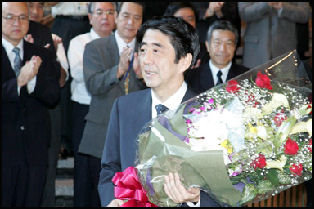
Abe resigns In mid September 2007, Abe suddenly resigned as Prime Minister just days after calling himself a “fighting politician." He cited his failure to win support for the MSDF refueling missions and said he suffered from health problems but most saw the move as an inevitable consequence of the humiliating election defeat for the LDP in July 2007. Still everyone was shocked by the suddenness and abruptness of his decision, especially his supporters and people associated with his pet issues, particularly the North Korean abduction issue.
Abe spent only a year in office — a tough year marred by scandals, struggles and disappointments. Many people saw Abe as a wimp who couldn't handle the stress, struggles and wear and tear that went with his office. Abe said he was suffering from poor health and checked into the hospital just one day after he quit. Koichi Nakasone, a political scientist at Sofia University, said, “Since the feudal era, generals have feigned sickness when in fact they just lost it."
Abe said he suffered from a longstanding bowel illness; Abe was diagnosed with functional gastrointestinal disorder and was spent about a week in the hospital recovering after he resigned. In a news conference Abe's doctor said the prime minister was “extremely weak” and had lost five kilograms over the past few months. His symptoms included stomach irritations, pain, poor appetite. Endoscope examinations found nothing abnormal in his stomach or intestines.
While in the hospital Abe apologized for his abrupt resignation, “I announced by resignation at the worst time — at the beginning of the Diet session and shortly after making a policy speech." He said resigned because health made him unable to carry the responsibilities of his job. Many believe he suffered from irritable bowel syndrom, a stress-related intestinal affliction characterized by feelings of indigestion in the upper abdomen and stomach, diarrhea and trouble with bowel movements with no ulcer, cancer or other obvious reason to explain the disorder.
Abe was roundly criticized for his resignation. Opposition leader Ichiro Ozawa said it was the first time in his political career of 40 years that he had witnesses a prime minister quit within days of delivering a policy speech, “To tell you he truth I've no idea what was going through Prime Minister Abe's mind before he made his announcement." Members of his own party were equally upset and perplexed. One said, “I’m disappointed in him as he's tossed out his administration." Another said, “How does he see the responsibilities of a prime minister? Abe returned to power in late 2012.
Yasuo Fukuda
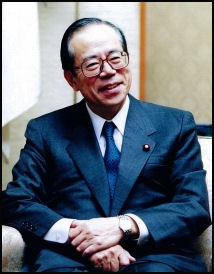
Yasuo Fukuda, a former Chief Cabinet Secretary, was selected as Japan’s 58th prime minister after Abe’s resignation. He scored a comfortable but not decisive victory over then LDP Secretary General Taro Aso in the election among LDP members for the party presidency. He won 62.6 percent of the ballots. Of the 330 votes he won 254 were from Diet members and 76 were from the provinces. Most of the 254 votes that Fukuda won came from the Diet members belonging to factions that lined up to support him. In the provinces he defeated Aso by a margin of only 76 to 65.
Fukuda was 71 when he took office. He was quickly chosen as a successor based mostly on his reputation as a pragmatic problem solver. Fukuda was born in Tokyo in 1936, went to school there and graduated from Waseda University. He is the son of former Prime Minister Takeo Fukuda, who also took office at age 71 and served for two years beginning in 1976. Yasuo Fukuda is the first Japanese prime minister to have a father who also served as prime minister
Fukuda spent much of his career as an oil company executive. He worked for 17 years at Maruzen Oil (predecessor of Cosmo Oil) after graduating from university. At the age of 40 he began working as a secretary for his father. In 1990 at the age of 53 he was elected to the lower house for the first time after his father retired from politics.
Fukuda became a vice foreign minister in 1995 and the head of LDP foreign affairs division in 1996. He served as chief cabinet secretary for a record 1,280 days under Mori and Koizumi from October 2000 to May 2004 when he was forced to resign because of his failure to pay some pension premiums. under Abe. Perhaps the biggest black mark on his career was that he was regarded as one of Abe’s closest advisors.
Fukuda as Leader
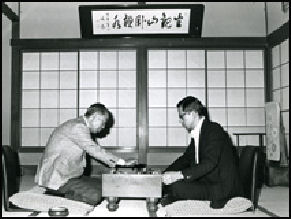
Fukuda and Fukuda Fukuda had a soft-spoken, congenial, diplomatic style. In the beginning anyway he was relaxed and affable with press and open and willing to compromise with the opposition. The calligraphy hung outside the cabinet room read “”wa” (harmony). His honeymoon didn’t last long. The struggles with the opposition that forced Abe to resign continued under Fukuda.
Fukuda kept most of Abe’s Cabinet ministers. Faction bosses took control of the LDP with many appointments seen as rewards for delivering Fukuda the prime minister’s office. Of the 254 Diet lawmakers that voted for him about 70 percent got jobs in Fukuda’s administration. Even Aso remained in the cabinet.
Fukuda started out with a 60 percent approval rating. By February 2008 Fukuda’s approval rating had dropped to 30 percent. His mild-mannered style which came off as urbane and judicious at first came across as weak and passive later on. By the time he adopted a more aggressive, confrontational manner it was too late and that style didn’t suit him anyway..
Policies Under Fukuda
Fukuda promised to establish a new body to handle consumer issues; said Japan would play a major role internationally fighting global warming and take a lead reducing greenhouse gases; and promised to create a more secure social security system.
On foreign policy issues Fukuda called for strong relations between Japan and the United States, China and South Korea but said there were limits on to what Japan could contribute to global security. North Korea became less of an issue than it was under Abe. Fukuda sought close ties with China as his father had done, He did not visit Yasukuni Shrine and earlier in his career criticized Koizumi for doing so because it angered China.
In November 2007, Japanese Prime Minister Fukuda made his first overseas trip as prime minister to the United States. In February, Fukuda attended the inauguration of South Korean President Lee Myung Bak and met with Lee a few hours after the inauguration, ushering in “a new era” of good relations between Japan and South Korea. The two leaders expressed their desire to work together and cooperate on the North Korea issue and promised to meet regularly.
Gridlock in Japanese Government, an Offer of a Grand Coalition
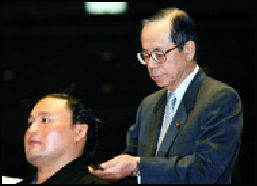
Fukuda cuts hair of
famous sumo wrestler The dominance of opposition Democratic Party of Japan (DJP) in the upper house produced gridlock, with the DJP blocking much of the legislation introduced by the LDP. One of the main goals of the DJP was to make the LDP look weak and force it to call an election in which presumably the the DJP would do very well in.
The opposition aggressively blocked legislation and appointments. The upper house rejected Fukuda’s choice for the BOJ head, leaving the post vacant for the first time since World War II.
In November 2007, Fukuda proposed forming a grand coalition to end the deadlock in parliament. He was flatly turned down by opposition leader Ichiro Ozawa, who then abruptly changed his mind and said he was interested in forming such a coalition, an idea that was swiftly rejected by his party, the DPJ. Afterwards Ozawa said that he was going to resign but then retracted his resignation, stayed on as the head of the DPJ and apologized to members of his party for his “clumsy handling” of the situation.
Ozawa appeared be acting on his own in seeking the coalition without the endorsement of his party. Although he appeared to have noble intentions the whole episode made him look rather foolish and threw his party into a state of confusion, The LDP pleaded desperately with Ozawa not to resign, and their desire to cling to him showed their its ability to come up with any other leaders.
Fukuda’s Decline
Fukuda was dogged by displeasure over the pension problem (See Elderly); poisoning caused by Chinese-made dumplings; corruption scandals involving the Defense Ministry; questions concerning military proficiency in the wake of collision between a navy destroyer and a fishing boat (See Military).
In November 2007, former Administrative Vice Defense Minister Takemasu Morita was arrested on charges of taking bribes. He was accused of giving favorable treatment to defense contractor Yamada Corp in connection with ministry choice for engine for the CX transport plane in exchange for gold, trips and other perks valued at over $40,000. Moriya’s wife, Sachiko, who was treated to dinners at expensive restaurants with Moriya by Yamada executives, was also charged with accepting bribes,
Moriya served as Vice Mister for four years, an unusually long tome. So long he was dubbed “Emperor of the Defense Ministry.” He stepped down in August 2007. In 2008 he was sentenced to 2½ years in prison.
Fukuda battled with the opposition over the appointment of a Bank of Japan (BOJ) leader and road taxes. He publically apologized for the blunders made by the government in the handling of the public pension problem and hardship suffered by people who contacted hepatitis C through tainted blood products.
Among the things that Fukuda was able to achieve was the use of road revenues for general use, the creation of a consumer affairs agency and the issuing of a ¥11.7 trillion stimulus package to get the economy moving in the face of rising food and fuel costs
Fukuda’s Resignation
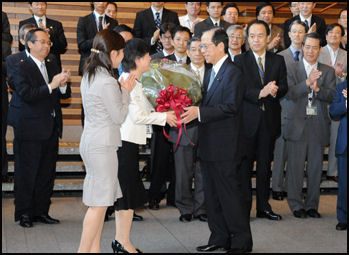
Fukuda resigns In early September 2008, Fukuda suddenly resigned. Without consulted anyone in his party he announced his decision at a hastily-prepared 9:30pm press conference, catching everyone off guard. He said he made the decision because of the failure of his new cabinet to accomplish much. “We have to seek the realization of policies under a new lineup. That’s why I decided to resign. The situation will certainly be different if someone other than me takes the helm.”
Fukuda said he was “mentally exhausted,” his approval ratings were extremely low and felt his party would be better served with a new administration. In the weeks before the resignation Fukuda had been dogged by a number of problems. The DPJ continued to block his policies in the upper house and increasingly the LDP’s coalition partner New Komeito was calling the shots in the coalition. A newly-announced ¥11.7 trillion stimulus and one-year tax break package was New Komeito’s idea. Fukuda attempt to turn things around by reshuffling his cabinet in August drew a collective yawn.
Taro Aso
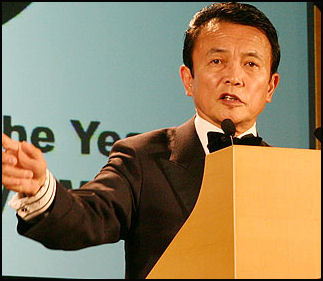
Taro Aso, the LDP Party Secretary and the person who finished second to Fukuda in the 2007 LDP election, won in the election among LDP members for the party presidency this time around and became Japan’s 59th prime minister.
Five candidates ran for the LDP president. Asa was the favorite. He was the current LDP Party Secretary. Other candidates included Yuriko Koike, a woman and former Defense Minister, and Nobuteru Ishihara, the son of Tokyo’s colorful mayor. For the most part, the LDP race failed to muster much interest among ordinary Japanese.
Aso’s political pedigree was even more impressive than that of his predecessors. His grandfather on his mother’s side is former Prime Minister Shigeru Yoshida (1878-1967), arguably the most important postwar prime minister, who in turn was a descendant of Toshimichi Okubo, one of the important figures in the Meiji Restoration in the 19th century. Aso’s wife is the daughter of former Prime Minister Zenko Suzuki. Aso’s father was lower house member. His sister is married to Prince Tomohito of Mikasa, a cousin of the Emperor.
Taro Aso’s Life
Aso was born in 1940 in Fukuoka Prefecture. He was strongly influenced by his grandfather Yoshida who lavished attention on Aso when he was a boy. Aso graduated from Gakushuin University in 1963.
Aso’s family ran Aso Mining. Documents from the National Archives in the United States and Japanese archives show that Aso Mining used hundreds of British and Australian prisoners slaves to mine for coal during World War II. A letter typed on Aso company stationary, requesting 300 prisoners to use to work for 12-hour days for one year was found in the United States National Archives. Documents corroborating these were found in Japanese archives, Survivors who worked under similar arrangements said hey were often worked 15 hours a day in primitive conditions and were given little eat and were regularly beaten,
Aso was member of Japan’s Olympic team in Montreal in 1976, participating in the trapshooting event. At the age of 30 he became vice president of Aso Cement Co, an offshoot of Aso Mining. He became president of the company when he 33 and ran it in the 1970s.
Aso speaks good English and has a reputation for being a friendly, affable and outgoing man. He is a big manga fan, reading more than 10 comic magazines a week, and routinely giving street speeches in Akihabara, the otaku (nerd) center of Tokyo. As foreign minister he established the International Manga Award, which he described as “the Nobel Prize of Manga.” “Golgo 13", a classic manga about a professional assassin, is said to be Aso’s favorite manga. At a time when he headed a group that aimed to regulate pornographic manga he was known as “Rosen Aso” because of his fondness of “Rozen Maiden”, a manga with many beautiful girls dolls.
Aso is one the government’s richest members. His family assets are valued at $44.6 million, They include a 720-square-meter mansion on a 2.400-square meter tract fo land in Tokyo that is said to be worth than $40 million., and a summer resort in the Nagano area worth $2 million.
Taro Aso’s Political Career
Aso is a longtime veteran of Japanese politics who heads his own faction. He won his first seat in the lower house in 1979 at the age of 39. He lost his seat in 1983 but won it back in 1986. He emerged as a figure in the LDP in the 1990s when he was a close aide to LDP president Yoehei Kono. His stature increased further when he introduced a soccer lottery under Prime Minister Mori. In 2001 he ran unsuccessfully against Koizumi for LDP leader but became the LDP policy chief and held several important cabinet positions, including foreign minister, in the Koizumi administration. In 2006 he tried again to be LDP leader and lost to Abe, who became prime minister.
In 2007, Aso was named LDP Secretary General but lost the LDP presidential election to Fukuda, who became prime minister. After losing to Fukuda, Aso stayed very busy as if he knew that if he kept his profile high enough he would be anointed as Japan’s next prime minister. Over the year he gave 160 speeches across the country.
Finally on his forth try Aso became LDP president and prime minister of Japan. He scored an overwhelming victory over four candidates in party leadership elections, taking 351 votes, or 67 percent, of the 527 votes cast. Of the 351 votes cast for him 217 came from Diet members and 134 came from representatives of the party’s local branches, The runner up secured only 66 votes.
As a politician Aso has been characterized by some as a divisive nationalist. Time called Aso a “brash, freewheeling nationalist given to political gaffes.” He has a reputation for being outspoken, engaging on pork barrel politics and being hawkish in foreign policy, sometimes antagonizing China and South Korea. One of his worst gaffes was in 2003 when claimed that Koreans voluntarily adopted Japanese names during Japan’s colonial rule of the Korean Peninsula.
Taro Aso as Prime Minister
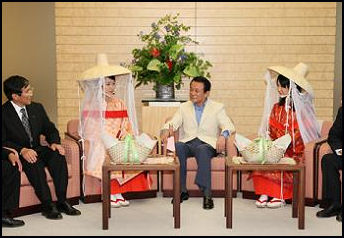
Aso became prime minister in the middle of the global financial crisis. After taking office he passed two economic stimilus packages. He also sought to extend the refueling mission in the Indian Ocean and promised to combat terrorism and global warming, challenge North Korea, improve the economy and hinted that he would retreat from the reformist policies of Koizumi.
Aso’s tone was unusually confrontive for a Japanese politician. He challenged the opposition to adequately explain its policies and describe how they would finance them, essentially telling them to put up or shut up.
Aso’s 17-person cbainet included two women, one oft them being Tuko Obuchi, the 34-year-old daughter of former Prime Minister Keizo Obuchi. Most of the others were seasoned politicians in their 50s and 60s who looked as much like Yakuza gangsters as politicians.
There was some discussion that Aso might call early elections, as early as November, two months after he took office, but in the end he didn’t, using the financial crisis after the collapse of Lehman Brothers as a reason not to.
Taro Aso’s Quick Decline as Prime Minister
Aso got off to a bad start. One his first day in office, while he was in New York giving a glitch-ridden speech before the United Nations, his Construction and Transport Ministers, Nariaki Nakayama, was running off the mouth, making a number of controversial statements, such as calling Japan’s biggest schoolteacher’s union a “cancer” and saying it should be “disbanded” and offending minorities by saying Japan was “technically homogeneous.” Nakayama was forced to resign. Aso was also hurt by Koizumi’s retirement and signs that the LDP would return to its bad old pre-reformist ways.
Aso was also criticized for not be able to read the kanji (Chinese characters) written in his own speeches and making gaffes such as saying doctors do not have as much common sense as ordinary people. He joked about Alzheimer’s disease and said he wanted Japan to be an attractive destination for “rich Jews.” In a speech on the doctor shortage he said that doctors “lack common sense.” His comments about being manga fan worked against him. Instead of currying favor among young people and ordinary Japanese — the intent of expressing his love for manga — he was accused of being uneducated and spending his time reading manga instead of studying.
Aso faced obstruction by the opposition DPJ who walked on votes for some of his bills. He was blasted by former Prime Minister Koizumi over remarks by Aso that postal privatization was flawed and need to be rethought and said was not favor of postal privatization when he served in the Koizumi cabinet.
Aso’s popularity ratings plummeted amazingly fast, with his approval level reaching 20.9 percent in December 2008, half the figure recorded a month earlier. Within weeks after becoming prime minister the halls of the Japanese parliament were buzzing with rumors of breakaway factions, party rebellions and large numbers of LDP members breaking away from the party to start new parties. By early 2009 one survey found only 10 percent though Aso was fit to be prime minister.
Aso was criticized for acting slowly and indecisively on measures to get the economy going and being unable to unite members of his party and his own cabinet to get measures passed. His primary idea for getting the economy going was to give out coupon to all Japanese residents, a move that 70 percent of Japanese opposed.
Taro Aso’s Rebellious and Incompetent Cabinet
Aso’s appointees lacked experience and skill and sometimes rebelled and disobeyed his orders and went against his wishes. Some of his plans such as selling hotels owned by Japan Post at a cheap price and splitting the health ministry were opposed by members of his own party.
In February 2009, all of Japan was deeply embarrassed and the administration of Prime Minister Taro Aso came across as incompetent and out of touch at a crucial time when Finance Minister Shoichi Nakagawa, a good friend of Aso, appeared drunk during a press conference at a G-7 meeting held in Rome to discuss the economic crisis in 2008 and 2009. During a press conference Nakagawa slurred his speech, was unable to coherently answer questions and looked as if he might suddenly pass out.
Nakagawa attributed his behavior cold medicine and jet-lag fatigue. Many laughed at that explanation. Nakagawa has a reputation for being a heavy drinker. After the press conference he reportedly “behaved badly” at the Vatican Museum, trying to touch priceless objects. Afterward the incidents Nakagawa was forced to resign.
Image Sources: Kantei, Office of Japanese Prime Minister
Text Sources: New York Times, Washington Post, Los Angeles Times, Daily Yomiuri, Times of London, Japan National Tourist Organization (JNTO), National Geographic, The New Yorker, Time, Newsweek, Reuters, AP, Lonely Planet Guides, Compton’s Encyclopedia and various books and other publications.
Last updated September 2016
